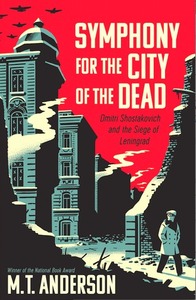Take a photo of a barcode or cover
370 reviews for:
Symphony for the City of the Dead: Dmitri Shostakovich and the Siege of Leningrad
M.T. Anderson
370 reviews for:
Symphony for the City of the Dead: Dmitri Shostakovich and the Siege of Leningrad
M.T. Anderson
I heard an interview on NPR on September 26 with M.T. Anderson about this book and had to buy it. Ever since playing the finale of the 5th symphony almost 30 years ago I have been curious about the life of this composer who wrote music with so much passion. The power of music and the human spirit is portrayed eloquently in this book.
Wow, this is a heavy book- both to hold and to read. I vaguely remember learning about the Siege of Leningrad in history, but we did not spend much time on it. This book goes into detail about the siege and also serves as a sort of mini biography of Dimitri Shostakovich's life. As a musician myself, it was interesting to read the author's views on musical interpretation, and this book has inspired me to listen to Shostakovich's Seventh Symphony (which I will probably go do as soon as I am done writing this review.)
The Siege of Leningrad was an especially horrific time in World War Two, and this book doesn't shy away from the more gory details of what happened during those 900 days. I would just warn that there were a few pages that I skipped over.
Symphony For the City of the Dead made me even more grateful that I don't live in wartime or under an oppressive government. I would recommend it for anyone who likes history, or wants to learn more about Russia, or about Dimitri Shostakovich.
The Siege of Leningrad was an especially horrific time in World War Two, and this book doesn't shy away from the more gory details of what happened during those 900 days. I would just warn that there were a few pages that I skipped over.
Symphony For the City of the Dead made me even more grateful that I don't live in wartime or under an oppressive government. I would recommend it for anyone who likes history, or wants to learn more about Russia, or about Dimitri Shostakovich.
This book contains two of my loves ww2 and music. what an amazing story of how music helped people survive. I love books that give me new perspective on a story I thought I already knew. For all my nonfiction lovers I highly recommended this one!
I think I would have looooooved this book...had it been written for adults. And honestly, if I was assessing it on behalf of its target teenage audience, it would be getting five stars. But as a historian and lover of this period of history in particular, I found myself really craving more in depth analysis of certain elements of both the siege and the Great Terror. M.T. Anderson is a tremendous writer, which is a tremendous benefit here, and he renders the horrifying 1930s and 1940s in Soviet Russia with a historian's dispassion mixed--thankfully--with a more poetic empathy. The result is a lovely read, although understandably below my own intellectual cravings.
This history book reads just like a novel in its telling of the life of Dmitri Shostakovich and his beloved city, Leningrad. It is filled with so much interesting information that you just have to read more to find out what happens next.
I especially liked how the book was written completely factually with a tad of commentary so that it doesn't feel like a list of facts but a book with a story. Symphony for the City of the Dead really stirred emotions inside of me, giving me even stronger opinions of Stalin and Hitler that I hadn't experienced before. When learning about World War II and other major conflicts, you hear more about the event as a whole, it's not broken down into individual battles and operations. This book explains many that pertain to Leningrad in a way that readers can understand and engage in. I also greatly enjoyed the photos displayed every few pages.
I really don't dislike anything from this book except that sometimes, the history becomes a little confusing so I had to reread some sections a few times to comprehend them.
Symphony for the City of the Dead is a fabulous account of World War II centered around a composer who lived in the midst of it all.
I especially liked how the book was written completely factually with a tad of commentary so that it doesn't feel like a list of facts but a book with a story. Symphony for the City of the Dead really stirred emotions inside of me, giving me even stronger opinions of Stalin and Hitler that I hadn't experienced before. When learning about World War II and other major conflicts, you hear more about the event as a whole, it's not broken down into individual battles and operations. This book explains many that pertain to Leningrad in a way that readers can understand and engage in. I also greatly enjoyed the photos displayed every few pages.
I really don't dislike anything from this book except that sometimes, the history becomes a little confusing so I had to reread some sections a few times to comprehend them.
Symphony for the City of the Dead is a fabulous account of World War II centered around a composer who lived in the midst of it all.
His is ostensibly for young adult readers, but I found it utterly fascinating. Written several years ago, it still resonates today as not only a superb biography of Dmitri Shostakovich and how he came to write his Leningrad Symphony, but also as a cautionary tale of what can happen when a megalomaniacal narcissist attempts to negotiate with someone set on world domination. I “read” the audio version, and I can’t recommend it highly enough
I picked this (audio)book up pretty casually, somewhat curious about the topic and the fact that the author of Feed had written something nonfiction. After finishing it, I am bowled over by the scope of this work.
Andersen uses the central topic of Shostakovich's life to tell the story of St. Petersburg, Russia in the first half of the twentieth century. As someone who vaguely pays attention to history, I was horrified to hear the brutal details of Stalin's rise, rule, and aftermath. I knew the outline, but learning the details via the dramatic pen of an author known for dark dystopia meant a particularly powerful weight.
Anderson has clearly done his research, pulling from diaries, letters, interviews after the fact, and countless other scholarly sources to pull together a picture of these horrors connected to Shostakovich. His writing about the actual music (a challenging task when the reader could have any range of musical knowledge) is clever and accurate; I may use his description of the role of narrative interpretation in non-narrative musical works some day as an example of great informative writing with my students. The audiobook also included clips of performances, which was delightful, though I believe there are a good amount of images in the print edition of this book I missed out on.
Overall, I can't wait to recommend this book to students. As a 500 pager, I know it'll be the rare war-obsessed seventh grader to brave the tome, but, oh, is it worth it. The start is a bit slow (the composer was, after all, once a child), but 1917-on is gripping, clever, and occasionally even darkly funny.
Andersen uses the central topic of Shostakovich's life to tell the story of St. Petersburg, Russia in the first half of the twentieth century. As someone who vaguely pays attention to history, I was horrified to hear the brutal details of Stalin's rise, rule, and aftermath. I knew the outline, but learning the details via the dramatic pen of an author known for dark dystopia meant a particularly powerful weight.
Anderson has clearly done his research, pulling from diaries, letters, interviews after the fact, and countless other scholarly sources to pull together a picture of these horrors connected to Shostakovich. His writing about the actual music (a challenging task when the reader could have any range of musical knowledge) is clever and accurate; I may use his description of the role of narrative interpretation in non-narrative musical works some day as an example of great informative writing with my students. The audiobook also included clips of performances, which was delightful, though I believe there are a good amount of images in the print edition of this book I missed out on.
Overall, I can't wait to recommend this book to students. As a 500 pager, I know it'll be the rare war-obsessed seventh grader to brave the tome, but, oh, is it worth it. The start is a bit slow (the composer was, after all, once a child), but 1917-on is gripping, clever, and occasionally even darkly funny.
I found myself drifting a bit as I listened to the beginning chapters of this one (I listened to it on audiobook), but by the end, I was very into it. The story of the siege and the people, and what the music meant to them, was much more interesting (albeit devastatingly sad) than the early years of Shostakovich's career and drifitng love life. The one thing I will say though - this audio book missed a HUGE opportunity to play the 7th symphony. There were clips here and there, but why on earth wouldn't they play the symphony in its entirety at the end of the book's recording? It's bad enough to read an entire book in print about the piece, with its moods and highs and lows and accept that. But to have an audio format not take advantage of its ability to introduce readers to the subject of the book was extremely disappointing.






